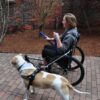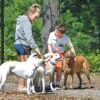Bringing a rescue dog into your home is more than just a charitable act; it’s a chance to shape a life. But often, these dogs come with a past that may have left them skittish or unsure. That’s where we step in, not just as owners, but as confidence builders. You see, giving a rescue dog a job isn’t just about keeping them busy; it’s about providing them with a sense of purpose that can transform their entire demeanor.
We rescued a senior afghan hound named Reggie who had been a champion show dog and came from a champion line of coursers. One thing I noticed was how well trained he was and well-behaved. I concluded that his involvement in formal organized activities gave him increased sense of purpose and confidence. It became crystal clear how much he liked “working” when I took him to a show to visit with his former trainer. “Yes!” I thought, “This dog loved working it in the rink.” He is the inspiration for Diggie the Dignified hound who loves to work the puparazzi.
Key Takeaways
- Basic obedience training sets the foundation for a confident rescue dog.
- A consistent daily routine can reduce anxiety and boost a dog’s confidence.
- Positive reinforcement is key to encouraging and building trust in rescue dogs.
- Jobs like agility, nose work, and therapy can help a dog gain confidence.
- Patience and compassion are essential when working with rescue dogs.
Giving Meaning To Your Dog’s Life
Every dog needs a sense of direction, and rescue dogs are no different. They thrive on structure and predictability. When we introduce jobs that align with their natural instincts and abilities, we’re not just giving them something to do; we’re helping them find their place in the world. This can significantly reduce their stress and anxiety, leading to a happier, more balanced pup.
Canine Mindset
Many rescue dogs have had turbulent beginnings. It’s not uncommon for them to experience fear, anxiety, or even aggression due to their past traumas. Understanding this is crucial because it informs how we approach their training and integration into our homes. It’s not just about teaching them to sit or stay; it’s about teaching them to trust again.
Being A Canine Career Coach
Not every job is right for every dog. Just like people, dogs have unique personalities and talents. The first step is to assess what your dog naturally gravitates towards. Do they have a strong sniffing instinct? Are they fast and agile? Or are they the type that loves to cuddle and offer emotional support? Observing these traits will help you identify the right job for your rescue.
Aptitude Assessments
Start by taking note of what your dog enjoys and what they’re good at. It’s also important to consider their energy level and how much interaction they’re comfortable with. For instance, a high-energy dog might excel in agility training, while a more reserved dog might be well-suited to therapy work. The key is to find a job that makes your dog’s tail wag with excitement.
Matching Interests with Ability
- Agility Training: Great for dogs with lots of energy and a love for physical activity.
- Nose Work: Perfect for curious dogs with a strong sense of smell.
- Therapy Work: Ideal for gentle dogs who enjoy human contact and can provide comfort.
- Trick Training: For the dog that loves to learn and engage with their owner.
- Search and Rescue: Suited for dogs with high drive, stamina, and a keen nose.
Remember, the job you choose for your dog should be fun and stress-free. It’s about building their confidence, not overwhelming them. So take it slow and watch as your rescue dog starts to shine.
Practice Makes Your Pooch Perfect
Learning is a process, and for rescue dogs, this process is not just about mastering a sit or a stay; it’s about building the confidence to try, fail, and try again. As you begin training your dog in their new job, remember that patience is your best friend. Your dog will look to you for cues, so stay calm and encouraging, and they’ll start to mirror that confidence.
Celebrate Every Win Large and Small
Success is built on a series of small victories. When your dog masters a small part of a larger task, celebrate it! This could be as simple as a “good job” and a treat, or some extra playtime. These celebrations reinforce their success and make learning a positive experience. And don’t forget to celebrate your own patience and growth as a trainer, too.
Establishing A Consistent Routine
Consistency is key when building new skills. Set up a daily routine that includes practice time for your dog’s new job. This doesn’t mean hours on end; short, focused sessions are more effective. Consistent practice helps your dog understand what’s expected of them and that they’re safe to explore and engage with their tasks.
Nourishing Your Rescue Dog’s Body and Soul
While the physical aspect of a job is important, we can’t forget the mental and emotional needs of our rescue dogs. They need a supportive environment that nurtures not just their ability to perform tasks but also their overall well-being. This means providing love, comfort, and mental stimulation that goes beyond their job.
Creating a Safe Space
Make sure your home is a safe haven for your rescue dog. This means a quiet place they can retreat to when they’re feeling overwhelmed, and a space where they can engage in their job-related tasks without fear of punishment or failure. In this safe environment, they’ll feel more comfortable trying new things and stretching their abilities.
Get In Tune with Your Dog’s Communication Style
Part of creating a supportive environment is being in tune with your dog’s emotional state. Pay attention to their body language and the signals they give you. If they seem stressed or anxious, it may be time to take a break or slow down the training. Recognizing and responding to these cues is critical for their emotional development.
It’s A Journey: The Long Road to A Confident Canine
Confidence building doesn’t stop once your dog has mastered their job. It’s an ongoing process that involves continuously challenging and engaging them. As they grow, their needs will change, and it’s up to us to adapt with them. Keep the journey interesting and your dog will continue to grow in confidence and ability.
Keeping It Interesting and Mixing It Up
- Introduce variations in tasks to keep your dog mentally stimulated.
- Gradually increase the difficulty of tasks as your dog becomes more confident.
- Combine tasks to create new challenges that require more complex thinking.
By consistently introducing new challenges, you’re communicating to your dog that you believe in their ability to succeed. This belief is infectious and will help your dog believe in themselves, too.
Teamwork: Adjusting Together
As your dog becomes more confident, their needs will change. They may need more physical exercise, more mental challenges, or even just more rest. Stay observant and flexible, ready to adapt your training and your daily routine to support your dog’s growth. After all, a happy, confident dog is the ultimate goal.
- Monitor your dog’s behavior and energy levels to gauge their needs.
- Be prepared to adjust the intensity and type of tasks to match their evolving skills.
- Always prioritize your dog’s overall well-being over any specific job or task.
Remember, building your rescue dog’s confidence through a job is a journey you’re taking together. It’s about more than just the tasks—it’s about the bond you’re strengthening and the joy you’re bringing into each other’s lives. With patience, consistency, and love, you’ll see your furry companion flourish.
Success Stories: Rescue Dogs Who Discovered Their Calling
Let’s take a moment to celebrate the successes. There are countless tales of rescue dogs who, once provided with a job, have turned their lives around. These stories aren’t just heartwarming; they’re a testament to the resilience and adaptability of dogs. They serve as a reminder of what’s possible when we invest time and love into our four-legged friends.
From Shy to Star: Dogs Who Shined Bright Through Their Jobs
Take, for example, a border collie named Max who was once too scared to leave his crate. With gentle encouragement and the introduction of agility training, Max went from cowering in the corner to leaping over hurdles with gusto. His story is one of many where a job has given a dog not just confidence, but also a new lease on life.
The Ripple Effect of Confidence on Overall Wellbeing
The impact of confidence-building jobs on rescue dogs extends far beyond the tasks themselves. A confident dog is a healthier, happier dog. This newfound assurance can lead to better eating habits, improved social behavior, and a deeper bond with their owner. It’s a ripple effect that touches every aspect of their life.
FAQ
When embarking on this journey with your rescue dog, questions are bound to arise. Here are some answers to common queries that might help guide you along the way.
How Long Does It Take to Build a Rescue Dog’s Confidence?
Building confidence is not an overnight process. It can take weeks, months, or even longer, depending on the dog’s history and personality. The key is consistency and patience. Celebrate every step forward, no matter how small, and trust that with time, your efforts will pay off.
How Will I Know That My Dog Is Gaining Confidence?
You’ll know your dog is becoming more confident when you see signs like:
- Willingness to explore new environments
- Increased playfulness
- Less hesitation when faced with new tasks or people
- More relaxed body language
- A stronger, more enthusiastic response to training cues
Can All Dogs Learn New Tricks?
Absolutely. Every dog has the potential to learn and grow, no matter their background. The key is finding the right job for them and introducing it at a pace they’re comfortable with. Remember, it’s about building confidence, not pushing them past their limits.
What If My Dog Seems Bored?
Some dogs may take longer to show interest in a job, and that’s okay. It’s all about finding what motivates them. Try different activities and see what sparks their curiosity. Sometimes, all it takes is a little bit of creativity to discover what they truly enjoy.
How Can I Boost My Dog’s Morale So They Don’t Get Frustrated?
Failure is just another opportunity to learn. If your dog struggles with a task, take a step back and break it down into smaller, more manageable parts. Offer plenty of encouragement, and never resort to punishment. Your support is what will help them overcome obstacles and try again.
In conclusion, giving your rescue dog a job can be one of the most fulfilling experiences for both of you. It’s about more than just giving them something to do; it’s about giving them a sense of purpose and belonging. Through patience, consistency, and a lot of love, you can help your rescue dog blossom into a confident and happy companion.






